Women Making an Impact
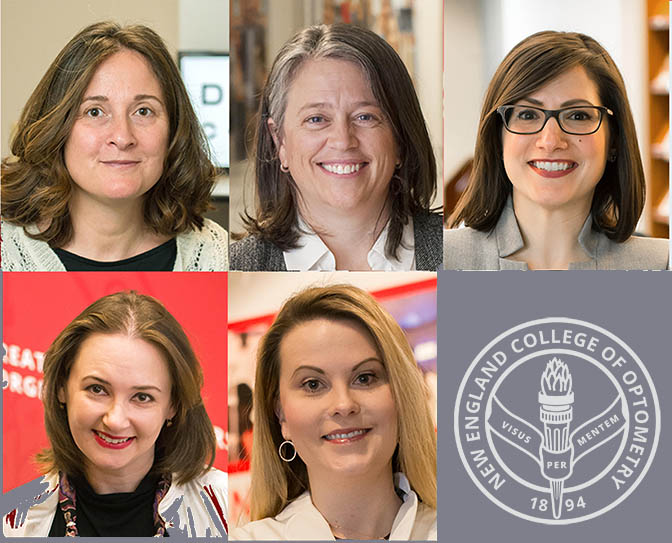
The NECO women featured here are among the many innovators in our community. We applaud the continued contributions to the field from the NECO faculty and researchers who are influencing the next generation of optometrists and the field of optometry.
Elena Z. Biffi, OD, MSc, FAAO: Creating innovations in ocular imaging
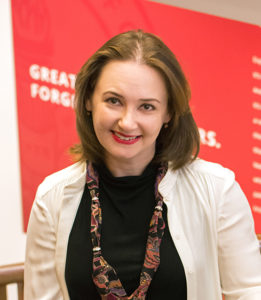
Dr. Elena Biffi
Dr. Elena Biffi is considered an international expert in ocular imaging, particularly Optical Coherence Tomography (OCT) — a noninvasive image test that allows eye care professionals to take cross-section pictures of the retina using light waves. In 2018, she developed a smartphone app “OCTaVIA” that puts an atlas of OCT reference images at the fingertips of busy doctors, educators, and students.
“There is an urgent need in education and clinical practice for a dedicated smartphone/tablet app that can present a well-annotated collection of OCT images for multiple diseases in a fast, clear, and easy manner,” she says. “OCTaVIA is this app!” The OCTaVIA app has been downloaded over 7,000 times across the United States, Canada, Australia, South America and Europe. A new version is due to launch in 2020.
As a researcher, Dr. Biffi focuses on using OCT to advance understanding, diagnosis, and clinical management of ocular retinal diseases. She is looking into novel approaches to apply OCT technology in vascular and neurocognitive medicine. “Finding retinal biomarkers, and being able to predict clinical progression of vascular and cognitive disorders, can lay the foundation of a potentially revolutionary approach in clinical vision and neuroscience,” she says.
Dr. Biffi is a NECO Associate Professor of Optometry who teaches the third-year courses on Clinical Ocular Imaging and Advanced Procedures used in diagnosis and management of ocular diseases. She’s also an attending optometrist at the NECO Center for Eye Care clinic in South Boston Community Health Center.
Nicole Quinn, OD: Developing the future of pediatric optometry
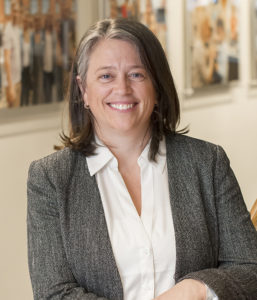
Dr. Nicole Quinn
Throughout her career, Dr. Quinn has helped move the profession of pediatric optometry forward — as an educator, clinical optometrist, and researcher. Her treatment and research interests include strabismus, amblyopia, convergence insufficiency, and mild traumatic brain injury. “There’s a lot more research done in pediatric optometry since I started 20 years ago,” she says. “We now have a stronger, scientific basis for providing evidenced-based care in the population.”
Dr. Quinn can see the future of pediatric optometry in her NECO students. “In pediatric optometry, we set up children for success throughout their lives, to enjoy their passions more fully. What’s most rewarding is watching the students I’ve taught or mentored grow as clinicians and go on to do great things with that knowledge,” she says. “Maybe it’s starting a clinic in a place that didn’t have access to pediatric optometry, or joining a hospital in a different area of the country as their first pediatric optometrist.”
Dr. Quinn shares this passion for helping children with her students. She earned her Doctor of Optometry degree at NECO and has become a highly respected educator. She serves as associate professor of optometry, assistant director of residencies, and residency supervisor for NECO’s Pediatric Optometry Residency.
She was named a Women In Optometry Theia Excellence Award Winner for 2019 for education. One nominator described her as “incredibly intelligent and approachable, the combination of which makes a great leader.” She is also a past Association of Schools and Colleges of Optometry (ASCO) Rising Star.
Nicole Ross, OD, MSc, FAAO: Giving hope to patients with low vision
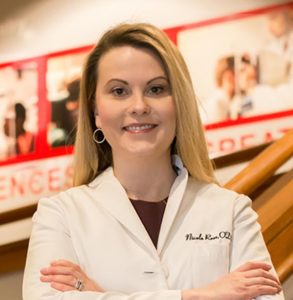
Dr. Nicole Ross
“Low vision has become an important public health issue. And for those affected, it’s a deeply personal issue.” So says NECO’s own Dr. Nicole Ross, who has made low vision her specialty since earning her dual OD/MSc degree with honors of distinction. Today, as one of her field’s most respected experts, she’s sharing her wisdom as a NECO professor.
“Taking care of patients with chronic ocular conditions involves more than simply providing a diagnosis,” says Dr. Ross. “It’s helping the patient learn how to use the sight they have to their greatest advantage.”
Dr. Ross’s impact is international, having taught courses in China, India, Nigeria and also virtually via Orbis CyberSight. She recently received a federal research grant from the National Institute on Disability, Independent Living, and Rehabilitation Research to study the role and potential impact of mobile technology for seniors with vision impairment. She also continues to collaborate in several multi-center research projects that include topics like eye movements in patients with central vision loss, image enhancement, and tele-rehabilitation. Dr. Ross was named an ASCO Rising Star in 2016, and she serves as the current Chair of the Annual Meeting Planning Committee for the low vision cross sectional group at the Association for Research in Vision and Ophthalmology (ARVO).
Still, Dr. Ross says her greatest satisfaction comes from guiding her students on their paths to becoming optometrists, while helping low vision patients live fuller lives. She is a clinical and didactic instructor for optometry interns focusing on low vision and is the instructor of record for courses on low vision rehabilitation.
“As is true for many women, my career can be attributed to the many mentors I’ve had,” says Dr. Ross. “Those mentors connected me to others whom also offered guidance and allowed me to build a network of individuals whom I work with today on multicenter projects. Now I’m happy to keep growing that tradition here as I work with optometry and graduate students in the clinic, classroom and the research lab.”
Diane Russo, OD, MPH, FAAO: A public health viewpoint of eye care
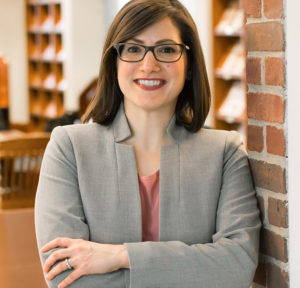
Dr. Diane Russo
During her residency training at a VA hospital, Dr. Diane Russo worked with low vision patients at a rehabilitation center for the blind. “We participated in manual skills training — including using a table saw blindfolded,” she says of the residency. “We learned to not only have empathy for patients, but how empowered they could become with access to quality training.” She began to view optometry through the lens of public health.
She adds, “If the patient is socially or financially unable to take a medication or use a device we’re prescribing, or come back for follow-up appointments, then we didn’t really help them.” She has since worked to advance optometry as a public health profession, as NECO instructor of record for public health courses, a preceptor for clinical courses, and an attending optometrist treating underserved populations in Boston’s Dorchester neighborhood.
Dr. Russo received an ASCO (Association of Schools and Colleges of Optometry) 2019 Rising Star Award for “outstanding service to New England College of Optometry, through teaching, scholarship, administration, and professional service, most notably, her contributions to ASCO’s Public Health Educator’s Special Interest Group (SIG).” She has been a Fellow of the American Academy of Optometry since 2012 and is a Candidate for the Public Health and Environmental Vision Diplomate.
“Students focused on clinical practice want to know how public health is relevant,” she says. “My hope is to plant the seed to invite people to think bigger and broader. I take advantage of those learning opportunities — whether it’s asking them to consider the patient’s response to determine the best treatment and management plan, or interpreting epidemiology and evidence-based practice.”
Fuensanta A. Vera-Diaz, OD, PhD: Advancing knowledge of myopia control
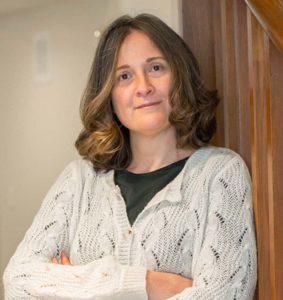
Dr. Fuensanta Vera-Diaz
Dr. Fuensanta Vera-Diaz began her work in childhood myopia two decades ago. Myopia is a condition where the eye grows too long, causing nearsightedness. Myopia can lead to complications including retinal detachment, glaucoma, and macular disease. As the number of children presenting with myopia increased, Dr. Vera-Diaz decided to focus her career efforts to better understand, treat, and control this major cause of vision impairment.
In 2017, Dr. Vera-Diaz started the NECO Center for Eye Care Myopia Control Clinic — one of a few such specialty clinics in New England — to address this growing public health problem. The need is urgent: 40 percent of the U.S. population between ages 12 and 54 have myopia. The World Health Organization has declared myopia a global health epidemic, affecting 2.5 billion people worldwide — a number expected to double by 2050. Under her leadership, the clinic is moving research into practice, with the expertise and state of the art equipment to diagnose and treat childhood myopia. Contact lenses with special multizone optical design, contact lenses that reshape the cornea, front of the eye multifocal glasses, and medicated eye drops can control myopia progression. The sooner children are treated, the better the outcome. “Even one diopter less of myopia reduces the risk for retinal detachment by 30 percent, glaucoma by 20 percent, and myopic maculopathy by 40 percent.”
Dr. Vera-Diaz is an internationally recognized expert in the field of myopia. She has 23 peer-reviewed publications in top-tier scientific journals, with nine as first author, and has written four book chapters. She received a Scientific Research Career Development Award from the American Academy of Optometry for her studies in myopia. She has also received five years of funding from the National Institutes of Health to conduct research in the etiology of myopia in children. “My research is focused on trying to find ways to control myopia and hopefully, eventually, to prevent it,” she says. “That’s my ultimate goal.”